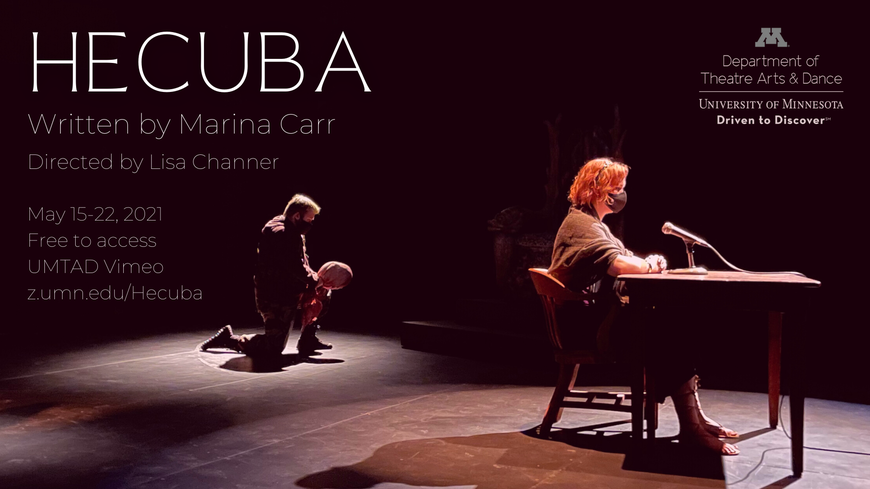Hecuba
Hecuba, by Marina Carr
Directed by Lisa Channer
May 15-22, 2021
Troy has fallen. It’s the end of war and the beginning of something else. Something worse. As the cries die down after the final battle, there are reckonings to be made. Humiliated by her defeat and imprisoned by the charismatic victor Agamemnon, the great queen Hecuba must wash the blood of her buried sons from her hands and lead her daughters forward into a world they no longer recognize. Agamemnon has slaughtered his own daughter to win this war. But now another sacrifice is demanded…
Rehearsed and filmed during a global pandemic in a year of multiple uprisings for justice, this production makes the case for the power of testimony, self reflection and accountability.
Premiering May 15, 2021 at 7:30pm CST through May 22, 2021
Presented on UMTAD Vimeo. ACCESS THE SHOW at vimeo.com/549473038.
PASSWORD NEEDED TO VIEW. Password is cap-sensitive!
PASSWORD: Hecuba
FEATURING
Maje Adams Agamemnon
Marguerite Arbogast Servant
Cora Casper Polyxena
Amber Frederick Polymestor
Vivian Kampschroer Servant
Ethan Lizotte Polydorus
David Meis Soldier
Owen Radke Soldier
Kyra Rahn Cassandra
Cole Seager Odysseus
Joel F Wilshire Neoptolemus
Genevieve Wisdom Hecuba
Rosie Melendez Polymestor’s child
Harris Arsham Polymestor’s child
Vivi Garcia Ipheginia, Daughter of Agamemnon
Hamony X. Garcia Daughter of Agamemnon
CREATIVE TEAM
Lisa Channer Director / Directing Mentor
Shannon Garwood Assistant Director/ Lead Director for scene 2.1
Mac Scheldt Assistant Director/ Lead Director for scene 5
KT Schearer Assistant Director / Lead Director for scene 4
Anna Meyer Stage Manager
Talvin Wilks Dramaturgical Support
Kimber Lawler Scenic Designer
Jon Brophy Lighting Designer
Micah Kopecky Sound Designer
Dakota Hall Composer
Matt LeFebvre Costume Mentor
Vivian Kampschroer Costume Designer
Deborah (Thea) Rudin Assistant to Costume Designer
David Meis Assistant to Costume Designer
Caitlin Hammel Videographer and Lead Editor
Jim Peitzman Videographer
Doug Scholz-Carlson Intimacy Director
Sonja Kuftinec Faculty Peer
Mac Scheldt, Kimber Lawler Continuity
FILM CREW
Micah Kopecky Audio Recording Engineer and Editor
Dustin Morache Audio Advisor and Student Mentor
Liza Hartshorn Deck Electrician
Deborah "Thea" Rudin Boom Mic Operator
Andrea Narveson Stage Crew
Melissa Franz Sound editor
EDITING CREW
Caitlin Hammel
Mac Scheldt
KT Schearer
DIRECTOR'S NOTE
"Men who win wars, win nothing" - Cassandra, Trojan Women
"They will lie about what happened here" - Cassandra, Hecuba
Euripides wrote Hecuba (424 BC) within ten years of his more famous play on the same story, Trojan Women (415 BC). He wrote both to call attention to the brutal activities being carried out in his name as an Athenian citizen during the contemporary Peloponnesian Wars. Sympathetic to the losers, both plays sparked war protests and calls for accountability from their Government by Athenenian citizens.
Marina Carr has called Euripides the first feminist playwright. Carr has altered a central plot point toward furthering the plays feminist ends. In her adaptation, Hecuba does not kill the children of Polymestor out of revenge for the death of her own youngest son, an act that in the original Euripides turns her into a mythic wild dog - a male vision of an angry powerful woman. Rather the children are killed by random soldiers in the mundane senselessness of war. “Wrong place, wrong time”, like countless children throughout time. In Carr’s version, Hecuba helps the grieving Polymestor and blesses the dead babes. She is broken but she remains profoundly human and Cassandra the prophet-daughter is here to set that record straight.
In both versions there is sympathy for Agamemnon. He is the brutal conqueror and destroyer of Troy, but he is also the father who was forced to kill his own daughter Iphigenia at the start of the war. The play Hecuba, taking place on the final day of that ten years war, finds him reckoning with that hideous sacrifice and the trauma that keeps reemerging in him. Like Hecuba, he attempts to regain his humanity amidst inhuman circumstances. War creates scorched nature, refugees, orphans and traumatized people - among them are those who do the “winning”.
This production was rehearsed and filmed in a year of a global pandemic and during powerful uprisings for long overdue justice. This is the context. All actors were masked and had to remain several feet from each other at all times. We framed the production within the context of a war tribunal modeled on truth and reconciliation committees found the world over. This set of contexts produced unique creativity in the cast, designers, crews and directors. Our final product reflects that year of collective adaptation. Some places the vision is sketched in and some places it is fully fleshed out. This is as it should be in a theatre laboratory.
In times of upheaval and crisis we must shift how the work is made. This year by necessity, we invented new ways to rehearse and collaborate that are not grounded in what we have always considered “standard” but rather respond to shifting realities as opportunities to adapt, communicate, re-envision and change. Thank you to the entire department and our guest film professionals for supporting this experiment. I’ve been honored to be part of Hecuba and proud to be a member of this community. May it serve as an honest record of this extraordinary year.
-Director, Lisa Channer
P.S. I’m happy to report we had not a single positive case of Covid 19 in our Hecuba family thanks to safety protocols and creativity.
